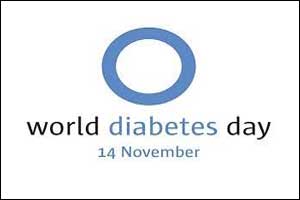- Home
- Editorial
- News
- Practice Guidelines
- Anesthesiology Guidelines
- Cancer Guidelines
- Cardiac Sciences Guidelines
- Critical Care Guidelines
- Dentistry Guidelines
- Dermatology Guidelines
- Diabetes and Endo Guidelines
- Diagnostics Guidelines
- ENT Guidelines
- Featured Practice Guidelines
- Gastroenterology Guidelines
- Geriatrics Guidelines
- Medicine Guidelines
- Nephrology Guidelines
- Neurosciences Guidelines
- Obs and Gynae Guidelines
- Ophthalmology Guidelines
- Orthopaedics Guidelines
- Paediatrics Guidelines
- Psychiatry Guidelines
- Pulmonology Guidelines
- Radiology Guidelines
- Surgery Guidelines
- Urology Guidelines
World Diabetes Day: Things you need to know

Diabetes is the general term used for conditions which lead to an increase in blood sugars and includes Type 1, Type 2, gestational diabetes and other forms of diabetes like secondary diabetes.
These occur when the pancreas is either unable to make sufficient amounts of insulin, or the insulin produced does not act properly (a condition known as insulin resistance).
Type 1 diabetes is an autoimmune condition in which insulin-producing cells are unable to make any insulin. Secondary diabetes may result due to ingestion of some medications like steroids etc or as an outcome of surgery where the pancreas is also involved.
Diabetes can be easily controlled by a combination of diet, exercise, and medicines. Long-term uncontrolled sugars may lead to complications involving heart, eye, nerves, and kidneys. It is possible to avoid/prevent complications with good blood sugar control.
There are some risk factors which may lead to increased chances of having diabetes, says Dr. S K Wangnoo, Senior Consultant (Endocrinology), Indraprastha Apollo Hospitals, New Delhi.
-Family history of diabetes
- Lifestyle: Sedentary habits, eating more of "junk foods", fizzy drinks, and erratic meal habits - all contribute towards the risk of having diabetes. Every extra hour of sitting increases risk of having diabetes by a fifth.
- Weight gain: Obesity is one of the biggest triggers for future diabetes. Try to maintain ideal body weight: BMI < 22.9 Kg/m2 and waist circumference to less than 90 cm in male & 80 cm in females.
- Women with polycystic ovarian syndrome have an elevated risk of developing diabetes. They should be advised regarding good diet and lifestyle and regular follow up with their treating doctors.
What can be done?
-Maintain a balanced diet routine. Eating at right time, an appropriate amount of a balance carbohydrates, fats and proteins with fruits is essential. Not going on the empty stomach for long hours and not missing the meals are important. Studies have shown that missing breakfast ups the risk of developing diabetes.
- Exercise regularly: Sedentary habits are contributing in a big way to increasing incidences of diabetes. At least 30-45 minutes of exercise daily which anyone can maintain and enjoy over a period of time without injuring oneself should be pursued daily.
- Get rid of excess weight through a regimented diet and exercise plan. There are no shortcuts to lose weight. insulin resistance and the good diet can even reverse pre-diabetes.
- Adequate sleep: Getting 7-8 hours of sleep every day is very important. It is during our sleep time that our body rejuvenates itself by eliminating the toxins which accumulate during the time we are awake. Late nights and late mornings also up the risk of having diabetes and hypertension.
-Manage stress: Stress has invaded every part of human life in today's world. From kids to elderly, stress has become all-encompassing. This is due to stiff competition in every part of life, no time for recreational activities or socializing and back-breaking workload. While this needs to be addressed at a higher level, it is essential that a person find ways to mitigate this stress.
- See your doctor in case of any queries rather than following "internet advice".

Disclaimer: This site is primarily intended for healthcare professionals. Any content/information on this website does not replace the advice of medical and/or health professionals and should not be construed as medical/diagnostic advice/endorsement or prescription. Use of this site is subject to our terms of use, privacy policy, advertisement policy. © 2020 Minerva Medical Treatment Pvt Ltd